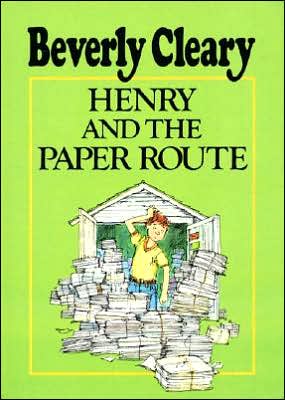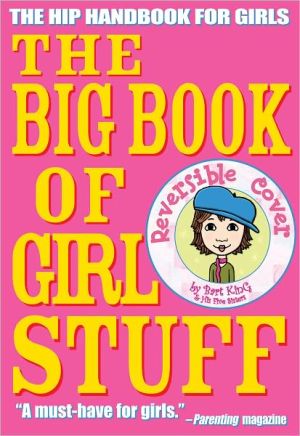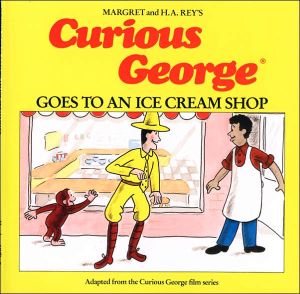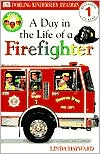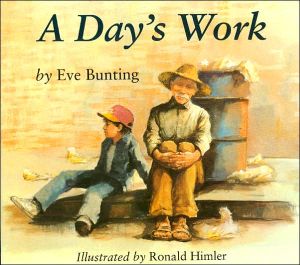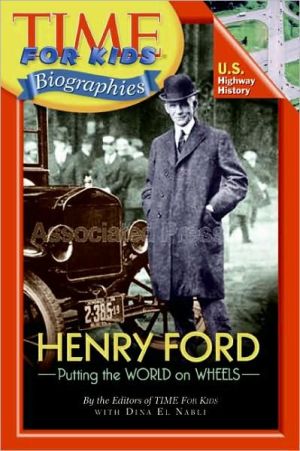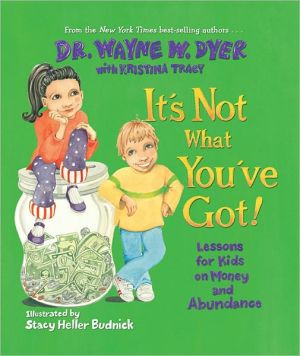Henry and the Paper Route
Henry's valiant efforts to get his own paper route are finally rewarded—with a little help from Ramona.\ \ \ Henry, the quintessential all-American boy, is seized with the urge to do something really important, and becoming a paper boy seems like just the thing. But, as usual, Henry's plans go awry, and he must get help from an unlikely source to make his paper route a success.\
Search in google:
Henry's valiant efforts to get his own paper route are finally rewarded—with a little help from Ramona.New York TimesWhen Ramona takes over, she is as wild funny as ever.
Chapter One\ \ \ Henry's Bargain\ \ \ One Friday afternoon Henry Huggins sat on the front steps of his white house on Klickitat Street, with his dog Ribsy at his feet. He was busy trying to pick the cover off an old golf ball to see what was inside. It was not very interesting work, but it was keeping him busy until he could think of something better to do. What he really wanted, he decided, was to do something different; but how he wanted that something to be different, he did not know.\ "Hi, Henry," a girl's voice called, as Henry picked away at the tough covering of the golf ball. It was Beatrice, or Beezus, as everyone called her. As usual, she was followed by her little sister Ramona, who was hopping and skipping along the sidewalk. When Ramona came to a tree, she stepped into its shadow and then jumped out suddenly.\ `Hi, Beezus, Henry called hopefully. For a girl, Beezus was pretty good at thinking up interesting things to do. "What are you doing?" he asked, when the girls reached his house. He could see that Beezus had a ball of red yarn in her hands.\ "Going to the store for Mother," answered Beezus, as her fingers worked at the yarn.\ I mean what's that in your hands?" Henry asked.\ "I'm knitting on a spool," Beezus explained.\ "You take a spool and drive four nails in one end, and you take some yarn and a crochet hook -- like this. See?" Deftly she lifted loops of yarn over the nails in the spool to show Henry what she was doing.\ "But what does it make?" Henry asked.\ "A long piece of knitting." Beezus held up her work to show Henry a tail of knitted red yarn that came out of thehole in the center of the spool.\ "But what's it good for?" Henry asked.\ "I don't know," admitted Beezus, her fingers and the crochet hook flying. "But it's fun to do."\ Ramona squeezed herself into the shadow of a telephone pole. Then she jumped out and looked quickly over her shoulder.\ "What does she keep doing that for?" Henry asked curiously, as he picked off a large piece of the golf-ball cover. He was getting closer to the inside now.\ "She's trying to get rid of her shadow," Beezus explained. I keep telling her she can't, but she keeps trying anyway. Mother read her that poem: 'I have a little shadow that goes in and out with me, and what can be the use of him is more than I can see.' She decided she didn't want a shadow tagging around after her." Beezus turned to her sister. "Come on, Ramona. Mother said not to dawdle."\ "Oh, for Pete's sake," muttered Henry, as the girls left. Knitting a long red tail that wasn't good for anything, and trying to get rid of a shadow the dumb things girls did! They didn't make sense. Then he looked at the battered golf ball in his hands and the thought came to him that what be was doing didn't make much sense either. In disgust he tossed the golf ball onto the lawn.\ Ribsy uncurled himself from the foot of the steps and got up to examine the golf ball. He picked it up in his teeth and trotted to the top of the driveway, where he dropped it and watched it roll down the slope to the sidewalk. just before it rolled on into the street, he raced down and caught the ball in his mouth. Then he trotted back up the driveway and dropped the ball again.\ Henry watched Ribsy play with the golf ball, and he decided that this afternoon everyone -- even his dog -- was busy doing something that made no sense at all. What he wanted to do was something that made sense, something important. Something like . . . something . . . Well, he couldn't think exactly what, but something important.\ "Hi, there, Henry!" A folded newspaper landed with a thump on the grass in front of Henry.\ " Oh, hi, Scooter," answered Henry, glad of an excuse to talk to someone, even if it was Scooter McCarthy.\ Scooter was in the seventh grade at Glenwood School, while Henry was only in the fifth. Naturally, Scooter felt pretty superior when Henry was around. Henry looked at Scooter sitting on his bicycle, with one foot against the curb and his canvas bag of Journals over his shoulders. He thought it must be fun to ride down the street tossing papers to the right and to the left, and getting paid for it.\ "Say, Henry," said Scooter. "Mr. Capper -- he's in charge of all the Journal boys around here he's looking for somebody to take a route. You don't happen to know anybody around here who would like to deliver papers, do you?"\ "Sure," answered Henry eagerly. "Me."' Talk about opportunity knocking! It was practically pounding on his door. A paper route was important, and Henry knew that delivering the Journal was exactly what he wanted to do. It made sense.\ Scooter looked thoughtfully at Henry, who waited for him to scoff, the way he usually did at almost anything Henry said. But this time Scooter surprised Henry. He did not scoff. Instead, he said seriously, "No, I don't believe you could do it."\ Henry would have felt better if Scooter had said, "You deliver papers? Ha! Big joke," or something like that. Then Henry would have known that Scooter was just talking. But to have Scooter say, "No, I don't believe you could do it. . . .\ Well, Henry knew Scooter really meant it.\ " What's wrong with me delivering papers?" Henry demanded. I can throw just as good as you can.\ "Well, for one thing, you're not old enough," Scooter explained. "You have to be eleven to have a paper route."\ "I'm practically eleven," said Henry. I have a birthday in a couple of months. Less than that, really. I feel eleven, and if you can deliver papers, I guess I could too."
1Henry's Bargain72Henry and the Premiums393Henry's Advertisements754The Paper Drive1035Henry's New Neighbor1336Ramona Takes Over158
\ New York TimesWhen Ramona takes over, she is as wild funny as ever.\ \ \ \ \ Saturday ReviewThis book is certain of a warm welcome.\ \ \ New York TimesWhen Ramona takes over, she is as wild funny as ever.\ \ \ \ \ Publishers WeeklyThe well-loved cast of characters is all here in this Cleary classic Henry Huggins and pooch Ribsy, Beezus and her little sister Ramona the Pest. Youthful television actor Harris breathes life into the gang, and his versatility and boyish charms are on full display. In this tale of childhood ambition and ingenuity, 10-year-old Henry devises various schemes to realize his dream of starting a paper route, including an offer of free kittens for new subscriptions. Always lurking is unpredictable four-year-old Ramona. Unfortunately, she represents the narration's one trouble spot. Harris tends to overdo Ramona's voice, rendering her lines in a demanding scream-whine. She comes across as pest-like and annoying for sure, but lacking in dimension, as well. Otherwise, Harris flawlessly animates the entire neighborhood, from sweet and innocent Henry to cocky Scooter to lisping boy genius Murph. Originally written in 1957, this story may leave today's parents wistful about an era with such a carefree childhood. Kids, however, should still recognize themselves in these characters, clear as day. The audiobook also contains an insightful interview with Cleary. Ages 8-up. (July) Copyright 2006 Reed Business Information.\ \ \ \ \ Children's LiteratureThe thought of any Beverly Cleary book being relegated to out-of-print status might well send chills down the spine of many a parent of school-age children. For some, befriending the likes of Ramona and Beezus Quimby and their friend Henry Huggins was just as much a part of childhood as little league practice and piano recitals. Imagining childhood without them would seem downright empty. Thanks to the clear-headed thinking of editors at HarperCollins, today's parents won't experience any such void for their own children. Half a century later, Henry and the gang are just as fresh and loveable, naughty and industrious as ever. The clean, innocent parlance of these kids might seem unrealistic to some older readers, but the universal appeal remains—Ramona is forever full of mischief, Beezus yet tortured by her annoying little sister, and Henry always looking to create something out of nothing. When Henry gets the bug to find a job, he decides a paper route is the way to go. With the help and despite the hindrance of friends and neighbors on Klickitat Street, he discovers that he is capable of earning the job and doing it well. A box full of kittens and a new neighbor who is building a robot out of old wire and scrap metal add life to this tale that embraces community, hard work, family and fun. 2001 (orig. 1957), HarperTrophy/HarperCollins, $5.95. Ages 8 to 12. Reviewer: Karen Deans\ \
